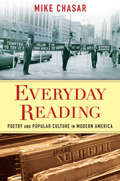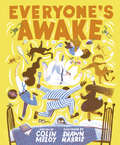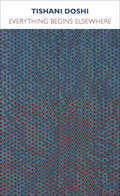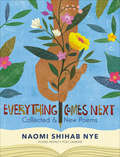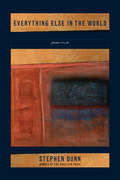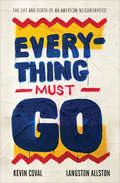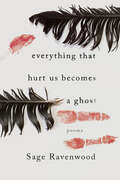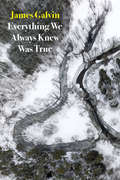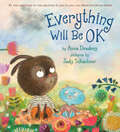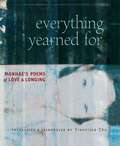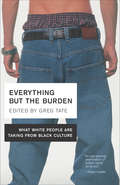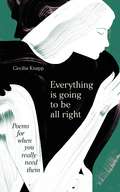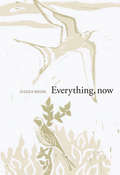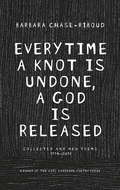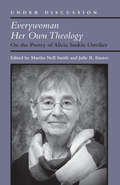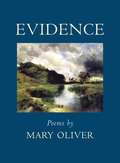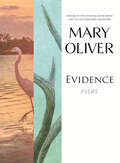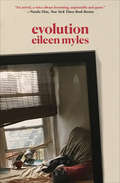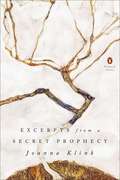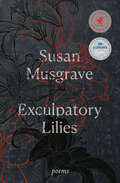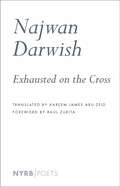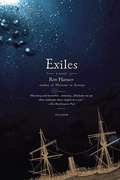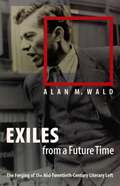- Table View
- List View
Everyday Reading: Poetry and Popular Culture in Modern America
by Mike ChasarExploring poetry scrapbooks, old-time radio show recordings, advertising verse, corporate archives, and Hallmark greeting cards, among other unconventional sources, Mike Chasar casts American poetry as an everyday phenomenon consumed and created by a vast range of readers. He shows how American poetry in the first half of the twentieth century and its reception helped set the stage for the dynamics of popular culture and mass media today. Poetry was then part and parcel of American popular culture, spreading rapidly as the consumer economy expanded and companies exploited its profit-making potential. Poetry also offered ordinary Americans creative, emotional, political, and intellectual modes of expression, whether through scrapbooking, participation in radio programs, or poetry contests. Reenvisioning the uses of twentieth-century poetry, Chasar provides a richer understanding of the innovations of modernist and avant-garde poets and the American reading public's sophisticated powers of feeling and perception.
Everyone's Awake
by Colin MeloyA silly and sublime bedtime book from the New York Times bestselling children's book author Colin Meloy.Giggle your way to sweet and silly dreams! A simple goodnight routine turns marvelously madcap in this cleverly rhymed picture book. Instead of settling down to sleep, Dad bakes bread, Mom fixes the roof, and Grandma plays cards with a ghost. And between the dog, the cat, Sister, and Brother, there's at least three different wars being waged! A modern classic perfect for read-aloud fun and bedtime alike.• A wildly fun read-aloud book for families• A laugh-out-loud book perfect for any child who struggles with getting ready for bed• Written by the lead singer of the Decemberists, the silly and clever rhymes make Everyone's Awake fun for both parent and child.Fans of Goodnight Already and Dinosaur vs. Bedtime will find Everyone's Awake to be a perfect path to a good night's sleep.• Children's books for kids ages 5-8• Family read-aloud books• Books for bedtimeColin Meloy is the lead singer and songwriter of The Decemberists, and the author of several children's books, including the New York Times bestselling Wildwood series. He lives in Portland, Oregon.Shawn Harris is an artist and musician who lives in Northern California. He is the illustrator of several award-winning children's books including Her Right Foot and What Can a Citizen Do?
Everything Begins Elsewhere
by Tishani Doshi"Free of the habitual lyricism of Indian writers, [Doshi's] work is austere and beautiful. Her refreshing muscularity gives her a distinct voice, both as a woman and an Indian."-The London Times"A work of a striking, emerging talent, who is prepared to take risks in pursuit of sensual, emotionally engaged and passionate poetry."-Judge's citation, Forward PrizeIn her second book of poetry-and her American debut-Tishani Doshi returns to the body as a central theme, while extending beyond the corporeal to challenge the more metaphysical borders of space and time. These new poems are powerful meditations born on the joineries of life and death, union and separation, memory and dream, where lovers speak to each other across the centuries and daughters wander into their mothers' childhoods."After the Rains"After the rainsthe temple flowerslie like fallen soldiers-dirtied and bloodied pink.I want to get downon bended knee,gather each broken petalto my chest.Out there-where the river meetsthe ocean's mouth,it would be calledthe kiss of life,a resuscitation.But herewith the world washed clean,it is nothing but a trampling.Tishani Doshi is an award-winning poet, journalist, and dancer. She has written for newspapers such as the Guardian, International Herald Tribune, The Hindu Times, and the Financial Times. Her first novel, The Pleasure Seekers (Bloomsbury, 2010), has been translated into several languages. She lives in Chennai (Madras), India.
Everything Comes Next: Collected and New Poems
by Naomi Shihab NyeBeloved and acclaimed poet Naomi Shihab Nye is the current Young People’s Poet Laureate, serving until August 2021. This celebratory book collects in one volume her most popular and accessible poems from the past forty years. Featuring new, never-before-published poems, an introduction by bestselling poet and author Edward Hirsch, as well as a foreword and writing tips by the poet, and stunning artwork by bestselling artist Rafael López, Everything Comes Next is essential for poetry readers, classroom teachers, and library collections. Everything Comes Next is a treasure chest of Naomi Shihab Nye’s most beloved poems. From favorites such as “Famous” and “A Valentine for Ernest Mann,” to the widely shared “Kindness” and “Gate A-4,” this collection celebrates her term as Young People’s Poet Laureate. The book is an introduction to the poet’s work for new readers as well as a comprehensive edition for classroom and family sharing. Writing prompts and tips by the award-winning poet make this an outstanding choice for aspiring poets of all ages.
Everything Else in the World: Poems
by Stephen Dunn"Essential to contemporary poetry collections."--Library Journal In his fourteenth collection, Stephen Dunn, "one of our indispensable poets" (Miami Herald), continues to probe brilliantly the unsaid and the elusive in the lives we live, in language that Gerald Stern has called "unbearably fearless and beautiful."
Everything Must Go: The Life and Death of an American Neighborhood
by Kevin CovalA unique artistic tribute to a Chicago neighborhood lost to gentrification: &“Kevin Coval made me understand what it is to be a poet&” (Chance the Rapper, Grammy winner and activist). Everything Must Go is an illustrated collection of poems in the spirit of a graphic novel, a collaboration between poet Kevin Coval and illustrator Langston Allston. The book celebrates Chicago&’s Wicker Park in the late 1990s, Coval&’s home as a young artist, the ancestral neighborhood of his forebears, and a vibrant enclave populated by colorful characters. Allston&’s illustrations honor the neighborhood as it once was, before gentrification remade it. The book excavates and mourns that which has been lost in transition and serves as a template for understanding the process of displacement and reinvention currently reshaping American cities. &“Chicago&’s unofficial poet laureate.&” —NPR
Everything That Hurt Us Becomes a Ghost: Poems
by Sage RavenwoodSage Ravenwood is a deaf Indigenous poet whose work deals with the lingering, resurgent trauma of familial violence and the machinations of colonialism. Everything That Hurt Us Becomes a Ghost is a poet’s response to her place in the wider world, exploring grief, anger, tenderness, and defiance. Ravenwood sheds light on Indigenous issues such as MMIW (Missing and Murdered Indigenous Women) and the Native American boarding schools, but she also makes space to center the natural world and her reverence of it. The poems in this collection are unafraid to name rage and pain as driving emotions yet strive for understanding and a way forward to healing.
Everything We Always Knew Was True
by James Galvin"James Galvin has a voice and a world, perhaps the two most difficult things to achieve in poetry."-The Nation "Bleak and unsentimental but blessedly free of self-indulgence, these poems give the feeling of being absolutely essential."-Library Journal"Galvin [has] the virtues of precise observation and original language . . . a rigor of mind and firmness of phrasing which make [each] poem an architectural pleasure."-Harvard ReviewIn his first collection in seven years, James Galvin expands upon his signature spare and gnomic lyric as he engages restrained astonishment, desire, and loss in a confessional voice. Whether considering masterpieces of painting or describing the austere landscape of his native Wyoming ranchlands, Galvin turns to highly imagistic yet intimate narratives to rain down compassion within isolation.From "On the Sadness of Wedding Dresses":On starless, windless nights like thisI imagineI can hear the wedding dressesWeeping in their closets,Luminescent with hopeless longing,Like hollow angels.They know they will never be worn again.Who wants them now,After their one heroic day in the limelight?Yet they glow with desireIn the darkness of closets.James Galvin passionately depicts the rural American West and the interactions between humans and nature in his best-selling memoir The Meadow and his novel Fencing the Sky. Galvin is also the author of several volumes of poetry and teaches at the Iowa Writers' Workshop. He divides his time between Iowa and Wyoming.
Everything Will Be OK
by Anna DewdneyThe bestselling creators of Llama Llama and Skippyjon Jones bring warmth and humor to a story with a comforting message we could all use when times are tough: everything will be OK.Nothing is going right for little bunny today. His sandwich has jelly instead of cheese. He's lost his kite. Ow! And he's stubbed his toe! But while some days can feel more sad than happy, there's always a bright spot on the horizon. Anna Dewdney and Judy Schachner perfectly blend rhyme, humor, and comfort to show readers the way out of a tough spot--no matter if it's big or small.
Everything Yearned For
by David R Mccann Francisca ChoManhae (1879-1944), or Han Yongun, was a Korean Buddhist (Son) monk during the era of Japanese colonial occupation (1910-1945). Manhae is a political and cultural hero in Korea, and his works are studied by college students and school children alike. Everything Yearned For is a collection of 88 love poems, evocative of the mystical love poetry of Rumi, and even reminiscent of the work of Pablo Neruda.Though Manahe's poetry can be read allegorically on many levels - political and religious - it is completely unlike any other poetry in Buddhist or secular realm. The first poem, "My Lover's Silence," narrates the lover's departure and establishes the enduring themes of the work: the happiness of meeting, the sadness of separation, the agony of longing and waiting, and, most of all, the perfection of love in absence that demands the cost of one's ongoing life, as opposed to the relief of death. The Korean word translated in these poems as "love" and "lover" is nim, though nim has many and broad interpretations. Understandably, the identity of Manhae's lover, or "nim" has been the subject of much speculation. Manhae writes in his own preface: "Nim" is not only a human lover but everything yearned for. All beings are nim for the Buddha, and philosophy is the nim of Kant. The spring rain is nim for the rose, and Italy is the nim of Mazzini. Nim is what I love, but it also loves me. If romantic love is freedom, then so is my nim. But aren't you attached to the lofty name of freedom? Don't you also have a nim? If so, it's only your shadow. I write these poems for the young lambs wandering lost on the road home from the darkening plains.
Everything but the Burden: What White People Are Taking from Black Culture
by Greg TateMixing straight academic commentary with poems, excerpts from plays, and other more literature-oriented material, 18 contributions grapple with White America's appropriation of Black Culture. From Eminem to communist revolutionaries, a variety of kinds of appropriation are examined from a range of analytical perspectives. Tate ( also includes contributions that address Black appropriations of White and other cultures. Annotation (c)2003 Book News, Inc. , Portland, OR (booknews. com)
Everything is Going to be All Right: Poems for When You Really Need Them
by VariousFrom grief to toothache, heartbreak to homesickness, the power of finding solace in the words of another cannot be overstated.Whether it was written 300 years ago or in our present day, poetry provides a comforting light in the dark. Words may not always provide solutions, but they can at the very least offer us a sense of hope, and the reassurance that we are not alone in our experiences and in our feelings.The Poetry First Aid Kit is a ready-made toolkit that offers you a light in the dark, no matter what you are feeling. Comprising poems from literary classics to new, cutting edge voices writing about the world today, this extraordinary collection proves that we are never alone in the suffering we endure, and in the human spirit's capacity to overcome.Whether you are well-versed in poetry or sceptical to the power it holds, we hope that this collection will surprise you, entertain, and ultimately offer comfort through those difficult days.Featuring poems from: Kae Tempest, Hollie McNish, Raymond Antrobus, Salena Godden, Theresa Lola, Maya Angelou, Emily Dickinson and many, many more.
Everything is Going to be All Right: Poems for When You Really Need Them
by VariousFrom grief to toothache, heartbreak to homesickness, the power of finding solace in the words of another cannot be overstated.Whether it was written 300 years ago or in our present day, poetry provides a comforting light in the dark. Words may not always provide solutions, but they can at the very least offer us a sense of hope, and the reassurance that we are not alone in our experiences and in our feelings.The Poetry First Aid Kit is a ready-made toolkit that offers you a light in the dark, no matter what you are feeling. Comprising poems from literary classics to new, cutting edge voices writing about the world today, this extraordinary collection proves that we are never alone in the suffering we endure, and in the human spirit's capacity to overcome.Whether you are well-versed in poetry or sceptical to the power it holds, we hope that this collection will surprise you, entertain, and ultimately offer comfort through those difficult days.Featuring poems from: Kae Tempest, Hollie McNish, Raymond Antrobus, Salena Godden, Theresa Lola, Maya Angelou, Emily Dickinson and many, many more.
Everything, now
by Jessica MoorePart lyric, part memoir, Everything, now, Jessica Moore’s heart-rending debut, describes an untimely death and the journey of going on alone. The book stares down loss and struggles to transform that loss into language that can pass through boundaries of intricate sorrow; the act of translation here is not about two different languages—although Moore uses her own translation of Jean-François Beauchemin’s Turkana Boy as a template for translating death into life, past into present—but about the necessity to put the inexplicable into words that might hint at its intensity.
Everytime a Knot is Undone, a God is Released
by Barbara Chase-RiboudThe long breath of Barbara Chase-Riboud's poems recalls poets of the antique world we know only from fragments, like Sappho. And yet here is a disquieting and sumptuous contemporary voice that seems to gather up antiquity and modernity with equal fervor and scorn. These poems are sexually charged, possessed of a courtly disdain and a strange nobility that seems to well up from below to be self-creating and unlike the verse of any other poet writing today. Certainly one secret to this work is that Chase-Riboud's poems are informed by her epic, polished bronze sculptures, as her sculptures are informed by her narrative fiction, and her fiction by her poems. The idea of the Renaissance Man is almost a cliché, but how often do we get to see what it means for an artist to be a Renaissance Woman? Chase-Riboud has been a major in sculpture, fiction, and poetry for close to half a century: selling over a million copies of her path-breaking novel Sally Hemings in the late '70s, winning the Carl Sandburg Award for her second collection of poems in the late '80s, and now, nearly thirty years later, on the heels of a major retrospective of her sculpture at the Philadelphia Museum of Art and the Berkeley Art Museum, here is Everytime a Knot is Undone, a God is Released, her first new and collected volume of verse.From the Hardcover edition.
Everywoman Her Own Theology: On the Poetry of Alicia Suskin Ostriker (Under Discussion)
by Martha N Smith Julie R EnszerAlicia Ostriker’s artistic and intellectual productions as a poet, critic, and essayist over the past 50 years are protean and have been profoundly influential to generations of readers, writers, and critics. In all her writings, both the feminist and the human engage fiercely with the material and metaphysical world. Ostriker is a poet concerned with questions of social justice, equality, religion, and how to live in a world marked by both beauty and tragedy. <P><P> Everywoman Her Own Theology: On the Poetry of Alicia Suskin Ostriker engages Ostriker’s poetry from throughout her career, including her first volume Songs, her award-winning collection The Imaginary Lover, and her more recent work in the collections No Heaven, the volcano sequence, The Old Woman, the Tulip, and the Dog, and Waiting for the Light. Like her literary criticism and essays, Ostriker’s poetry explores themes of feminism, Jewish life, family, and social justice. <P><P> With insightful essays—some newly written for this collection—poets and literary critics including Toi Derricotte, Daisy Fried, Cynthia Hogue, Tony Hoagland, and Eleanor Wilner illuminate and open new pathways for critical engagement with Alicia Ostriker’s lifetime of poetic work.
Evidence: Poems
by Mary OliverTo me the meanest flower that blows can give / Thoughts that do often lie too deep for tears," she uncovers the evidence presented to us daily by nature, in rivers and stones, willows and field corn, the mockingbird's "embellishments," or the last hours of darkness.
Evidence: Poems
by Mary OliverNever afraid to shed the pretense of academic poetry, never shy of letting the power of an image lie in unadorned language, Mary Oliver offers us poems of arresting beauty that reflect on the power of love and the great gifts of the natural world. Inspired by the familiar lines from William Wordsworth, "To me the meanest flower that blows can give / Thoughts that do often lie too deep for tears," she uncovers the evidence presented to us daily by nature, in rivers and stones, willows and field corn, the mockingbird's "embellishments," or the last hours of darkness.
Evidentiality in Sa'dī's Poetry and Prose: A Corpus Stylistic Study (Iranian Studies)
by Behrooz Mahmoodi-Bakhtiari Masoumeh MehrabiThis study is the first to introduce evidentiality to the stylistic analysis of literary works, specifically that of the great Persian writer Sa'dī, focusing on how he used linguistic means to illustrate a real or ideational world. The authors begin by introducing the concept of evidentiality; its definition, its coding in Persian, the rationale behind evidentiality analysis, and semantic-pragmatic functions of evidentiality. The book highlights how evidentiality can be accounted for as a stylistic device to reveal the validity of a narration, as well as the author’s commitment and contribution to it. Three of Sa'dī’s major works are analyzed – Būstān, Golestān and Sonnets – using Krippendoff's frequency approach. It is argued that Sa'dī deployed an array of evidentials in his work, from direct visual evidentials in Golestān and Sonnets to heard and quoted evidentials in Būstān. To illustrate this, the book includes translations of Sa'dī’s poetry and prose. In addition, the authors consider historical and contemporary manifestations of the Persian narrative style, as well as exploring the cultural concerns of the Persian speech community. The book will appeal to general linguists, practitioners of pragmatics and stylistics, literary critics, and those interested in contrastive analysis of literature and cultural studies.
Evolution
by Eileen MylesThe new poetry collection from the award-winning author of Chelsea Girls reads like &“an arrival, a voice always becoming, unpinnable and queer&” (Natalie Diaz, New York Times Book Review). The first all-new collection of poems from Eileen Myles since 2011&’s Snowflake/different streets, Evolution follows the author&’s critically acclaimed Afterglow (a dog memoir), as well as a volume of selected poems, I Must Be Living Twice. In these new poems, we find the eminent, exuberant writer at the forefront of American literature, upending genre in a new vernacular that radiates insight, purpose, and risk while channeling of Quakers, Fresca, and cell phones. This long-awaited new collection &“lopes forward in the strutting style of the witnessing and sincere, but gorgeously nonaustere, poet in New York…The gift of Evolution is its bold depiction of the textually-rendered &‘I&’-Eileen&” (Kenyon Review). A New York Times Book Review Editors&’ Choice
Excerpts from a Secret Prophecy
by Joanna KlinkNew work from an awardwinning poetJoanna Klink has won acclaim for poetry of bracing emotional intensity. Of her most recent book, Raptus, Carolyn Forché has written that she is "a genuine poet, a born poet, and I am in awe of her achievement." The poems in Klink's new collection offer a closely keyed meditation on being alone--on a self fighting its way out of isolation, toward connection with other people and a vanishing world.
Exculpatory Lilies: Poems
by Susan MusgraveFrom the award-winning poet known for her bracing honesty and sharp yet compassionate gaze, here is a new collection of poems that explore life, marriage, addiction, death, and heart-wrenching grief.If grief is the willingness to be claimed by a story bigger than ourselves, Susan Musgrave writes, &“in that / tender wavering, I let grief in.&” "Writing about grief or tragedy is tricky. Hard to meet it at a heart-level without being effusive; hard to meet it at a brain-level without being cold. Hard not to make it about ourselves. Hard to meet it at a visceral level because it can take us out at the knees," wrote author Carrie Mac, responding to the death of Musgrave&’s partner, Stephen Reid, in 2018. Following this traumatic loss, in September 2021 their daughter, Sophie, died of an accidental overdose after a twenty-year struggle with addiction. But to say this is a collection solely about grief would be to miss the whole nature of Musgrave&’s voice and sensibility. Wit is one counterpoint; the natural world is another. The poems share a landscape whose creatures, minutely observed, wild and tame—the winged ones most of all—dance attendance on the helplessness of our brief and mystifying human lives. Throughout Exculpatory Lilies, Musgrave&’s alertness to even the most desolate places makes her personal sorrows astonishingly potent; and her scrutiny of language, and emotions, makes shot silk out of sackcloth and ashes.
Exhausted on the Cross
by Najwan DarwishA much-anticipated follow-up to Nothing More to Lose, this is only the second poetry collection translated into English from a vital voice of Arabic literature.&“We drag histories behind us,&” the Palestinian poet Najwan Darwish writes in Exhausted on the Cross, &“here / where there&’s neither land / nor sky.&” In pared-down lines, brilliantly translated from the Arabic by Kareem James Abu-Zeid, Darwish records what Raúl Zurita describes as &“something immemorial, almost unspeakable&”—a poetry driven by a &“moral imperative&” to be a &“colossal record of violence and, at the same time, the no less colossal record of compassion.&” Darwish&’s poems cross histories, cultures, and geographies, taking us from the grime of modern-day Shatila and the opulence of medieval Baghdad to the gardens of Samarkand and the open-air prison of present-day Gaza. We join the Persian poet Hafez in the conquered city of Shiraz and converse with the Prophet Mohammad in Medina. Poem after poem evokes the humor in the face of despair, the hope in the face of nightmare.
Exiles
by Ron HansenIn December 1875 the steamship Deutschland left Bremen, Germany, bound for America. On board were five nuns, exiled by a ban on religious orders, bound to begin their lives anew in Missouri. Their journey would end when the Deutschland ran aground at the mouth of the Thames and all five drowned. Ron Hansen tells their harrowing story, but also that of the poet and seminarian Gerard Manly Hopkins, and how the shipwreck moved him to write a grand poem, a revelatory work read throughout the world today. Combining a thrilling tragedy at sea, with the seeming shipwreck of Hopkins's own life, "Hansen brilliantly, if soberly, weaves two interrelated story lines into a riveting novel" (BooklistonExiles).
Exiles from a Future Time
by Alan M. WaldWith this book, Alan Wald launches a bold and passionate account of the U.S. Literary Left from the 1920s through the 1960s. Exiles from a Future Time, the first volume of a trilogy, focuses on the forging of a Communist-led literary tradition in the 1930s. Exploring writers' intimate lives and heartfelt political commitments, Wald draws on original research in scores of archives and personal collections of papers; correspondence and interviews with hundreds of writers and their friends and families; and a treasure trove of unpublished memoirs, fiction, and poetry. In fashioning a "humanscape" of the Literary Left, Wald not only reassesses acclaimed authors but also returns to memory dozens of forgotten, talented writers. The authors range from the familiar Mike Gold, Langston Hughes, and Muriel Rukeyser to William Attaway, John Malcolm Brinnin, Stanley Burnshaw, Joy Davidman, Sol Funaroff, Joseph Freeman, Alfred Hayes, Eugene Clay Holmes, V. J. Jerome, Ruth Lechlitner, and Frances Winwar.Focusing on the formation of the tradition and the organization of the Cultural Left, Wald investigates the "elective affinity" of its avant-garde poets, the "Afro-cosmopolitanism" of its Black radical literary movement, and the uneasy negotiation between feminist concerns and class identity among its women writers.
